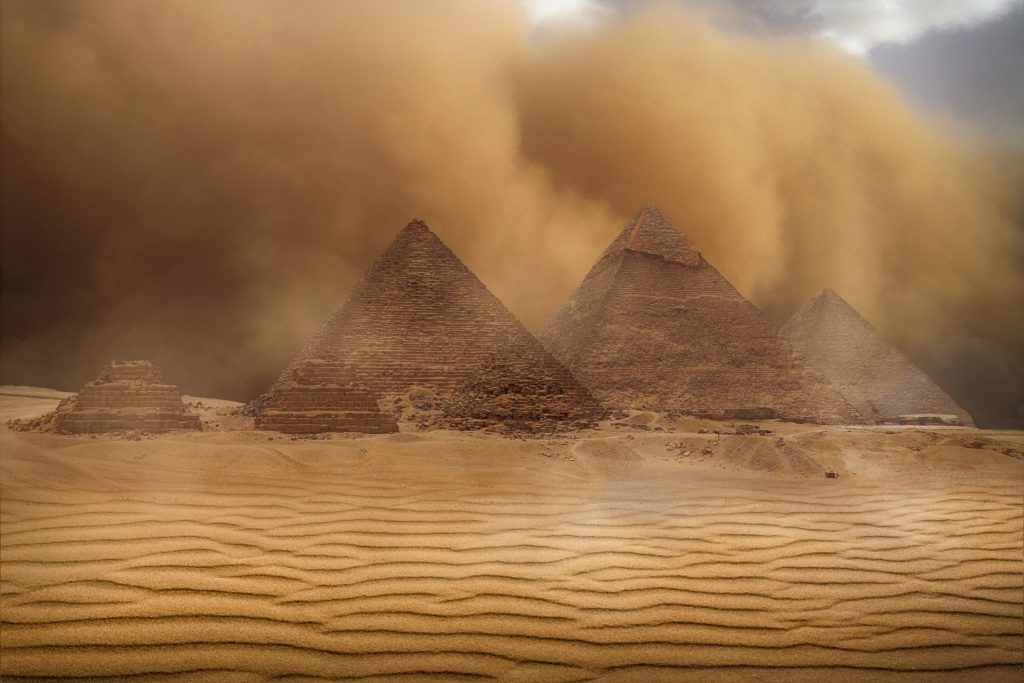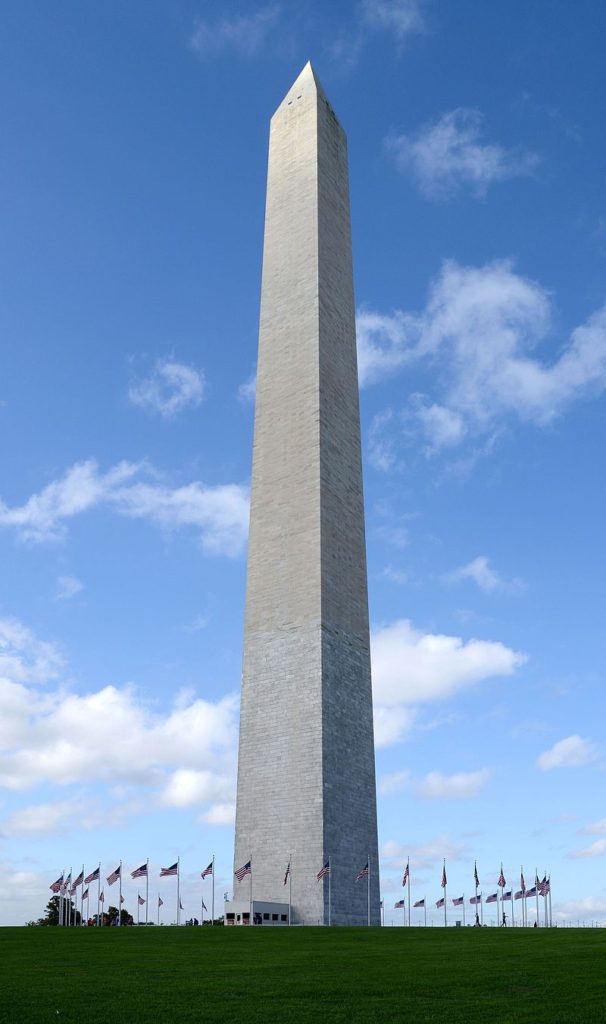Ancient Egypt: A pyramid scheme that worked
By Khaled Diab
Spanning some three millennia of recorded history, Ancient Egyptians built a state to last. What was behind this success and what can we learn from it? Quite a few surprising lessons, in fact.

Tuesday 5 January 2021
The failing state pandemic that has become all too familiar in the Middle East appears to be spreading to some of the wealthiest and most technologically advanced societies in the world.
The latest country to enter the fray of frailty is the United States. The fragility of the failing American state is evident in its disastrous performance in handling COVID-19 and its failure to minimise the human cost of the pandemic. It is visible in the expensive political circus that passed for an election and the post-election political shambles overtaking the country. It is apparent in the growing polarisation and increasingly vicious tribalism threatening to devour the country.
This has triggered doom-laden predictions that America, like its former superpower rival, the Soviet Union, is on the verge of a spectacular collapse.
Although Joe Biden may take over and pull his country back from the brink and begin the healing process after the catastrophic Trump years, there is little doubt that America is in the midst of at least gradual decline. Not only have other powerful countries narrowed the geopolitical and economic gap, America itself seems to be unravelling.
This would mean that America's rise and decline were spectacularly fast. With the largely unipolar world we have known since the fall of the Iron Curtain, it is hard for us to fathom that the United States only became a “superpower” after World War II and, before World War I, it was considered a medium-sized power.
This is not how it was meant to be. America's founders intended to build a political system that would stand the test of time. Symbolically, this was conveyed in their fondness for Ancient Egyptian symbols.

This stretches from the colossal Washington monument to the pyramid on the reverse side of the Great Seal of the United States, which was meant to signify strength and duration. In a bid to look even more Egyptian, Washington, DC, almost gained an actual pyramid, if a certain John Pope's ostentatious design for the Lincoln memorial had been approved by Congress.
And if you want to signify longevity there is little in human civilisation to rival the pyramids of Egypt, the first of which was constructed nearly five millennia ago and is still standing. Meanwhile, the Ancient Egyptian civilisation which constructed said pyramid had a recorded history of some three millennia (from the early dynastic era before 3000 BC to the fall of the Ptolemaic dynasty in 30 BC).
During that time, Ancient Egypt became divided on a couple of occasions. However, Egyptian civilisation did not enter a ‘dark age' during these so-called intermediate periods, as later Egyptians and many historians posited. Instead, it became more localised, with a decentralisation of power, greater economic equality and more social mobility.
Moreover, unlike our modern understanding of imperialism, the foreign conquerors of Ancient Egypt, such as the Macedonians, Persians and Hyksos, adopted Egyptian ways rather than imposing their own.
To put this into perspective, the pyramids were already ancient when the Ancient Romans took over Egypt and turned it into a province of their empire. In the two or so millennia since then, which is a millennium shorter than the lifespan of Egyptian civilisation, the world has witnessed the rise and fall of countless empires, states and civilisations, , including Rome and its successor Byzantium, the various Islamic empires, the Mongols and Mughals, the modern European empires and many more..
So what is behind the remarkable staying power of Ancient Egypt and are there any lessons the modern world can draw from it?
The short answer is that the system which the Ancient Egyptians built was uniquely suited to its surroundings. “The state lasted because its structure worked perfectly, especially within this particular natural environment and it was thus really trustworthy,” says Zeta Xekalaki, a Greek Egyptologist with a PhD from the University of Liverpool.
When what climatologist call the African Humid Period abruptly ended, causing the Sahara desert to revert to its natural dryness, the nomadic hunter-gatherers in what was to become Egypt faced a stark choice: adapt, move on or perish.
The people who eventually became the Egyptians found a way to adjust to the changing environment that was to prove highly successful and enduring. Not only did they settle down in the Nile Valley to become sedentary farmers, they also managed to innovate effective ways to harness the mighty fertile power of the river and to keep the unforgiving hell of the desert at bay.
“This made the populations who went on to consist the Egyptians form a worldview where management was everything,” observes Xekalaki. “To the Egyptian worldview, there was no alternative system able to control the environment and secure wealth as effectively as the one headed by a pharaoh.”
The image of the pharaoh as a benevolent despot has been used to defend Egypt's modern-day dictators, by suggesting that Egyptians understand no other way of government, and has been used to defend autocracy elsewhere in the world.
But this misunderstands the rationale for democracy. The value of democracy is not because democracies are more stable or effective than autocracies, though they often are, but because they are fairer and more just.
Moreover, we likely view the symbolic representation of the pharaoh as a god made human and the intermediary between this world and the afterlife from our modern monotheistic perspective very differently than the polytheistic Egyptians of the time did.
After all, symbolically, this is not all that different to the later concept of the divine right of kings to rule and the idea that monarchs are God's representatives on Earth, which implicitly underpins even modern constitutional monarchies – and makes them anathema to egalitarians like myself.
This also overlooks the checks and balances built into the Egyptian system. Although it is tempting to think that Egypt was governed by the whim of its monarch, historical evidence suggests that the king's despotic powers were kept in check through both the divine concept of Ma'at (harmony), which applied to the pharaoh too, and a complex system of secular laws and courts. Moreover, women in Ancient Egypt enjoyed more legal rights than anywhere else in the world at any time until the 20th century.
The modern image of the oppressed and downtrodden Ancient Egyptian peasant and worker also appears inaccurate in light of recent archaeological discoveries.
Not only were Egyptian workers well compensated for their labour, including some reports of state healthcare, they also learnt to stand up for their rights. This is eloquently expressed in the first (of many) recorded strike in human history, when unpaid artisans downed tools repeatedly to protest late wages and the pharaonic systems failure to perform its duties under Ma'at.
The geography and topography afforded by Egypt's location also played a central role in the development and endurance of Egyptian civilisation. “The Nile valley, despite being at the crossroads of the Mediterranean, Asia, and Africa, works remotely and in a way different to any other place on Earth,” explains Xekalaki.
The vast expanses of desert surrounding the Nile valley acted as natural and well-defined borders for the state, not to mention as defensive buffer zones. They also ensured that the country could take the time to develop its own unique civilisational model largely untroubled by outside threats.
Beyond being a de facto island, another vital factor in Ancient Egypt's success, in my analysis, was its disinterest in conquest and expansionism for most of its history. Many empires throughout history eventually collapsed because they grew too big for their boots and could no longer afford to maintain such enormous dominions.
Egypt, in contrast, never strayed far from its historical frontiers and focused its energies on maintaining its internal prosperity and security.
This was partly founded on Egyptian aloofness and contempt for other civilisations. Egyptians believed they lived in the best society and the idea of leaving their paradise on Earth was unthinkable.
That said, Ancient Egypt was relatively welcoming to foreigners and was a veritable melting pot of cultures and races. It even appears that the mysterious Hyksos were likely not foreign invaders, as later chronicles claim, but were a minority originally from the neighbouring Levant who took advantage of a power vacuum to seize control of the north without the need to shed blood.
Nevertheless, like elsewhere in the world throughout time, the perceived foreign threat was used following Egypt's reunification under the rule of the pharaohs to justify the main period of foreign conquest and expansionism in Ancient Egyptian history.
Egypt's geographical advantage eroded over the subsequent centuries, as military technology progressed and other civilisations became more powerful. Eventually, Egypt was first conquered geographically but not politically or culturally. Later, it was subsumed into other empires, its language, culture and religions dying or killed off in the process.
It is difficult to draw any clear lessons for the 21st century from the Egyptian experience. Egypt's location in the Fertile Crescent meant it was in the middle of the most vibrant area of human development back then but, crucially, it was shielded against threats from rival civilisations by its friend and foe, the vast moat of arid desert enveloping the fertile sliver of the Nile valley and Delta.
In addition, Egypt was so wealthy and technologically advanced, it was, for the most part, able to see off any potential threat quite easily. Moreover, the foreigners that did come were, for the most part, migrants not invaders, making the country a diverse and dynamic melting pot.
In today's far more crowded world, no country or society enjoys this level of protection against external threats. Moreover, though Egypt was advanced for its time and able to build things we'd be hard pressed to emulate in the modern world, the technology and complexity of the modern world would be bewildering to the Ancient Egyptian.
With this complexity, comes a heightened level of vulnerability and fragility, as the COVID-19 pandemic has shown us with its disruption of global supply chains.
In addition to the value of avoiding the ultimately destructive temptation of empire building, the greatest lesson Ancient Egypt can illuminate relates to the role of the state. Recent decades have seen the power of governments around the world eroded by global corporations and the private sector. This process started with the weakest and poorest countries but now extends to even the most powerful.
The neo-liberal worldview has convinced us that big government is always bad and that the private sector is far better at ensuring our prosperity and wellbeing than the state. The Ancient Egyptians did not receive that memo.
Back then, the state was responsible for pretty much everything: ensuring the land was properly managed and irrigated, collecting and redistributing taxes and, crucially, guaranteeing work for everyone. Seen through the prism of Keynesian economics and Roosevelt's New Deal, the pyramids were not (solely) acts of monumental folly but were the largest and grandest job creation scheme the world has ever known.
Ancient Egypt provides us with an interesting case study as we grapple with how to exit the ongoing economic crisis and wonder whether governments should intervene to safeguard work and welfare for everyone.
The Ancient Egyptian experience suggests that a greater role for the state would be good both for the wellbeing of the individual and the future viability of the state itself. This does not mean that we need to roll out a command economy like that of the pharaohs. After all, we do not face the centralised, nationwide challenges facing a pre-modern society seeking to harness the power of a mighty river in an otherwise hostile environment. What it means is that governments must embrace their role as the ultimate guarantors of citizen welfare and the equitable distribution of wealth.
________
This is the extended version of an article first published by Al Jazeera on 31 December 2020.



Nice article – but I think you do not properly articulate the role of the Pharoah. In fact, the Pharoah was more akin to the President of the US, than a European monarch. Egypt was fundamentally an egalitarian society. This is one reason why Egypt was so bizarre to Herodotus, as the Greek laws were founded on warrior principles which were fundamentally class oriented.
The high concept of Ma’at was the fundamental leveler of all social classes, i.e., the difference between the Pharaoh and the laborer was not in social standing as much as it was in knowledge of law and justice. The story of the eloquent peasant is a perfect example of the pervasiveness of egalitarian norms in ancient Egyptian society. Another is gender equality – both are obvious examples of the importance of egalitarian norms throughout the history of that society. The role of the Pharoah should be seen within this largest context and the outcome of the Pharoah’s will should be viewed as the result of dialectic with society and well-balanced state institutions.
I wrote this about the status of women in ancient Egypt. https://chronikler.com/europe/gender-issues/feminisms-egyptian-roots/